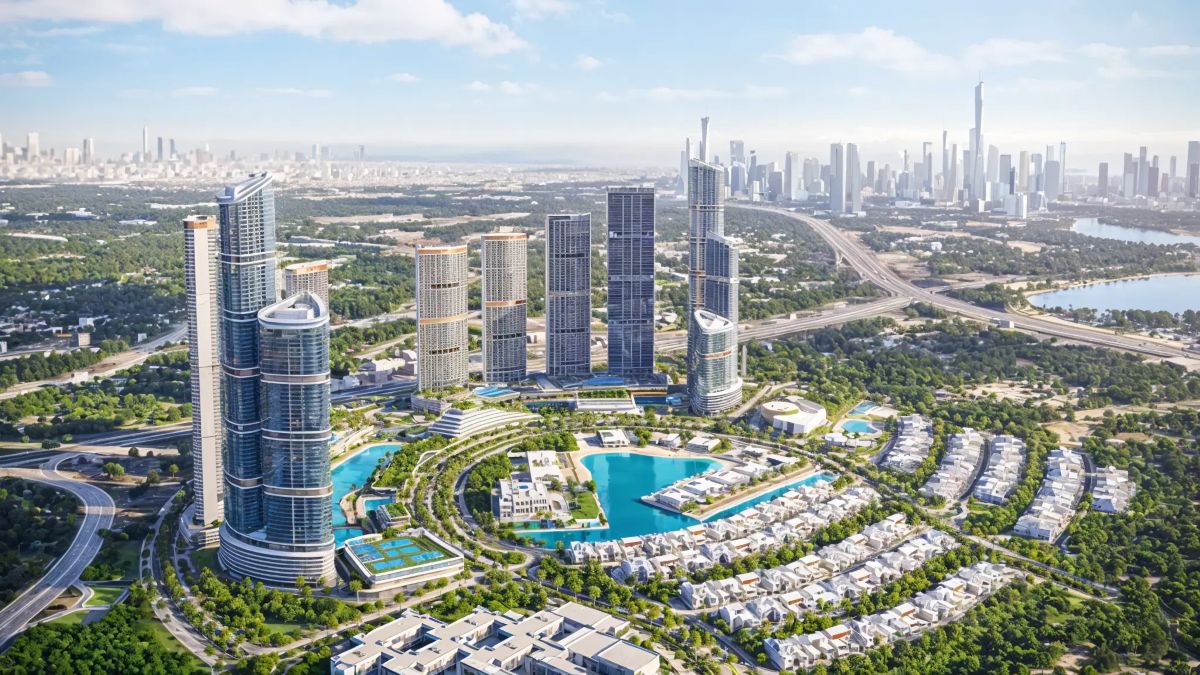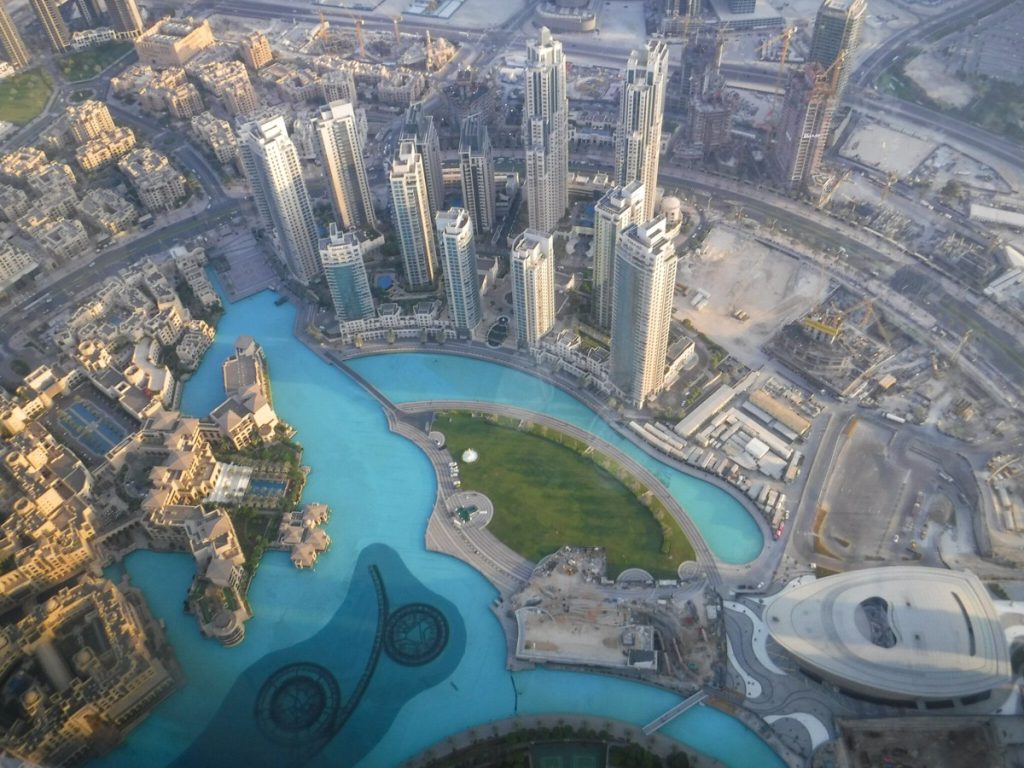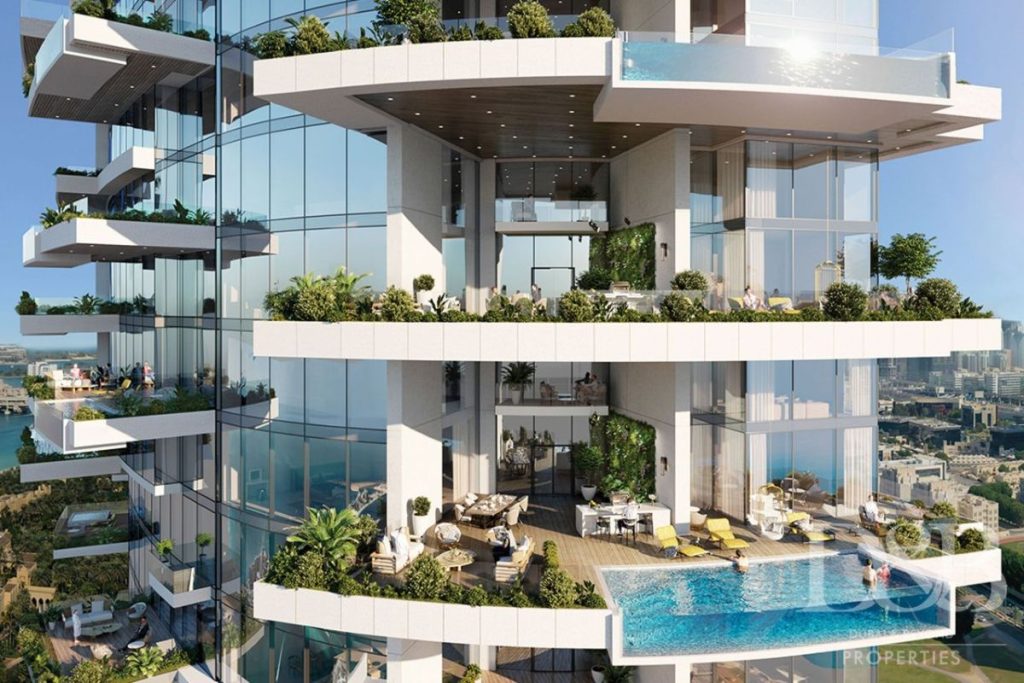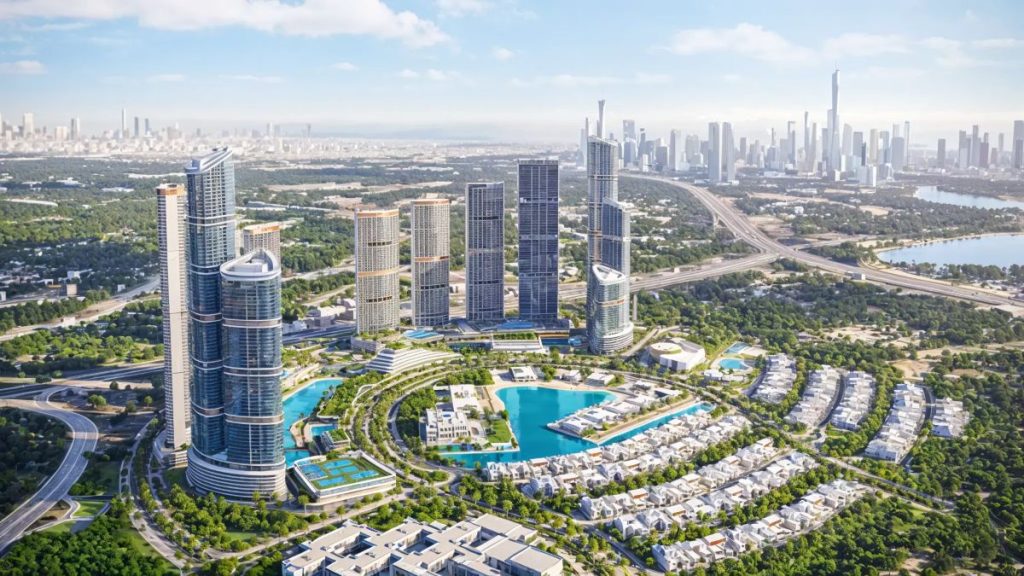
Why Invest in Dubai: Key Drivers Behind the Emirate’s Growth
To invest in Dubai today means tapping into one of the fastest-growing and most resilient economies in the world. The emirate has transformed itself from a small trading hub into a global center for business, tourism, and real estate within just a few decades. Investors from across the globe, including a growing number from India, are drawn to Dubai’s unique combination of safety, infrastructure, business-friendly policies, and lifestyle. The city’s appeal goes beyond traditional property purchases—it is also about long-term financial security and participation in one of the most dynamic markets in the Middle East.
Economic Diversification Beyond Oil
Unlike other economies in the region that remain heavily reliant on oil, Dubai has pursued an ambitious path of diversification. Today, less than 1% of Dubai’s GDP comes from oil revenues. Instead, the economy is driven by trade, logistics, finance, real estate, tourism, and technology. According to Dubai Statistics Center, the emirate recorded GDP growth of over 3.3% in 2023, with non-oil sectors contributing more than 95%.
This shift makes Dubai a stable environment for investors, less exposed to fluctuations in global oil prices. For property investors, economic diversification is a major reassurance, as it signals consistent demand for housing, commercial spaces, and hospitality developments. Unlike speculative markets, Dubai offers structural growth supported by real industries.
Real Estate as a Pillar of Growth
Dubai’s real estate sector has become a cornerstone of the economy. The city recorded more than AED 500 billion (approx. USD 136 billion) in property transactions in 2023, marking a new all-time high. Demand continues to rise in 2024, especially in prime locations such as Downtown Dubai, Dubai Marina, and Business Bay.
Residential real estate has been a particular success story. Apartments and villas in communities like Palm Jumeirah, Arabian Ranches, and Dubai Hills Estate offer high rental yields, often ranging between 6% and 8% annually, far above cities like London (2–3%) or New York (3–4%). The Dubai Land Department (DLD) has also streamlined registration processes, making it easier and more transparent for international investors to enter the market.
Appeal for Indian Investors
Indian nationals consistently rank among the top foreign buyers of property in Dubai. In 2023, they were second only to UK investors in terms of total investment volume. The reasons are clear:
- Proximity — just a 3-hour flight from Mumbai and 4 hours from Delhi.
- Tax advantages — no property tax and no capital gains tax.
- Lifestyle — world-class schools, healthcare, and leisure options.
- Community — a strong and established Indian diaspora in Dubai, offering cultural familiarity alongside global networking opportunities.
For many Indians, investing in Dubai is both a financial decision and a lifestyle upgrade. Families often purchase apartments for children studying in Dubai, while business owners invest in both commercial and residential spaces to support expansion into Middle Eastern markets.
Why Investors Choose Dubai
To summarize, the main reasons why global and Indian investors increasingly choose Dubai include:
- High ROI: Rental yields averaging 6–8%
- Safety and Stability: Low crime rates and strong governance
- World-Class Infrastructure: Airports, metro, ports, and telecom
- Expat-Friendly Policies: Long-term visas linked to real estate investment
- Tax Benefits: No property or capital gains tax
Dubai has successfully positioned itself as a magnet for investment by creating a secure, transparent, and rewarding environment for buyers and entrepreneurs. The combination of steady economic growth, a booming real estate market, and lifestyle advantages makes it one of the most attractive destinations for anyone considering long-term wealth creation.

How to Invest in Dubai Real Estate Securely
When you decide to invest in Dubai, real estate becomes one of the most reliable and rewarding options. The city’s property market is highly regulated, transparent, and offers opportunities across both residential and commercial sectors. However, to maximize returns and minimize risks, investors must follow the correct procedures, work with licensed professionals, and understand the dynamics of yields and appreciation. This chapter provides a practical guide to buying property in Dubai securely.
Step-by-Step Process of Buying Property in Dubai
Purchasing real estate in Dubai follows a clear and structured process designed to protect both local and international investors:
- Choosing the Location – The first step is to identify the community that aligns with your goals. For example, if you want luxury living and high prestige, Palm Jumeirah or Downtown Dubai are ideal. For stable long-term rental yields, communities like Dubai Marina, Jumeirah Village Circle (JVC), and Dubai Hills Estate are popular. Business-focused investors often look at Business Bay or DIFC.
- Selecting the Property – Buyers can choose between off-plan properties (under construction) and ready-to-move-in homes. Off-plan often comes with lower entry prices and flexible payment plans, while ready properties generate immediate rental income.
- Signing the Sales Agreement – After agreeing on terms, both buyer and seller sign a Memorandum of Understanding (MoU) with a 10% deposit typically paid.
- Registration with Dubai Land Department (DLD) – The DLD oversees all property transactions, ensuring transparency and legality. Registration fees amount to 4% of the property value, plus a small admin charge.
- Transfer of Ownership – Once all payments are complete, ownership is officially transferred and registered. Buyers receive the Title Deed from DLD, proving full ownership.
This structured process ensures that investors are well-protected from fraudulent practices and enjoy full legal rights to their assets.
Importance of Licensed Developers and Agencies
One of the most important aspects of secure investing is working with licensed developers and agencies. Dubai’s Real Estate Regulatory Agency (RERA) plays a crucial role here. RERA monitors developers, brokers, and property management firms to ensure compliance with laws.
- Buyers should always verify that the developer is registered with RERA.
- Real estate brokers must hold an active RERA license to operate legally.
- All off-plan projects must be registered with the DLD’s escrow account system, which ensures buyer payments are only used for construction of that specific project.
This system has dramatically reduced risks, giving international investors—especially first-time buyers—the confidence to enter the Dubai property market.
Residential vs. Commercial Properties
Investors considering whether to buy residential or commercial real estate should weigh the pros and cons of each.
- Residential Properties: Villas and apartments are highly liquid, with demand driven by Dubai’s growing expat population. Yields range between 6% and 8% annually. Popular communities include Dubai Marina, JVC, and Downtown. Capital appreciation has also been strong, with prime areas experiencing up to 15% price growth in 2023 alone.
- Commercial Properties: Offices, retail units, and warehouses cater to the business community. With Dubai’s status as a global business hub, commercial spaces are in constant demand, particularly in DIFC, Business Bay, and Dubai South (near the Expo City). Yields vary but often stand between 7% and 9%, making them an attractive option for business-oriented investors.
Comparative Rental Yields: Dubai vs. Mumbai and London
To highlight Dubai’s advantages, it’s helpful to compare average rental yields with other major global cities like Mumbai and London.
| City | Average Residential Yield | Market Notes |
| Dubai | 6–8% | High expat demand, tax-free environment, growing supply in master communities |
| Mumbai | 2–3% | High property prices, limited rental returns, strong end-user demand |
| London | 3–4% | Mature market, stable demand, but high taxes and transaction costs |
The comparison clearly shows why so many global investors choose to invest in Dubai. The emirate offers not only higher yields but also a more investor-friendly environment, with no capital gains tax, no annual property tax, and lower transaction costs compared to other international hubs.
Secure Investing for Long-Term Growth
For those seeking to invest in Dubai, the formula for success lies in three elements: choosing the right location, working only with licensed developers and brokers, and understanding market trends between residential and commercial properties. With clear legal frameworks, high transparency, and one of the most lucrative rental yield environments in the world, Dubai continues to stand out as a safe and profitable destination for real estate investment.

Invest in Dubai Through Business and Free Zones
For international entrepreneurs and investors, Dubai offers more than just real estate. The emirate has established itself as one of the world’s most attractive hubs for company formation, thanks to its tax-free regime, investor-friendly policies, and strategic location. To invest in Dubai effectively, many choose to combine property purchases with setting up a business, particularly within the city’s numerous free zones. This dual approach not only enhances return on investment (ROI) but also ensures long-term stability and growth opportunities.
Benefits of Setting Up a Company in Dubai
Dubai’s pro-business environment is built on simplicity and efficiency. Registering a company provides several key advantages:
- 100% Foreign Ownership – In free zones, investors retain full control over their businesses without the need for a local sponsor.
- Tax Advantages – There is no personal income tax, no capital gains tax, and very competitive corporate tax structures.
- Global Connectivity – Dubai is strategically located between Asia, Europe, and Africa, making it an ideal hub for trade and investment.
- Ease of Doing Business – Streamlined government procedures, digital platforms, and strong legal frameworks simplify the registration process.
For Indian entrepreneurs, Dubai’s proximity and direct flight connections from major cities like Delhi and Mumbai make it particularly appealing for expansion.
Key Free Zones: DIFC, DMCC, JAFZA
Dubai’s free zones are specialized clusters designed to support different industries. Three of the most influential include:
- Dubai International Financial Centre (DIFC): Focused on finance, fintech, and professional services. DIFC offers a globally recognized legal system and is home to more than 4,000 active companies.
- Dubai Multi Commodities Centre (DMCC): Known as the world’s leading free zone for commodities trade, from gold and diamonds to energy and food. It has consistently been ranked among the best free zones worldwide.
- Jebel Ali Free Zone (JAFZA): Positioned near Jebel Ali Port, this free zone supports logistics, shipping, and manufacturing, with over 8,000 companies from 100+ countries.
These zones not only attract businesses but also stimulate real estate demand, as employees, executives, and entrepreneurs require housing, offices, and lifestyle amenities.
Real Estate Demand Created by Business Migration
The influx of companies into Dubai’s free zones directly fuels the property market. Every entrepreneur who establishes a business here also needs offices, staff accommodations, and personal residences. This trend drives:
- Office Space Demand: Flexible workspaces and modern offices in Business Bay, DIFC, and Dubai South remain highly sought after.
- Co-Living and Serviced Apartments: With a young workforce arriving from around the globe, affordable yet modern housing is essential.
- Long-Term Rentals: Families relocating for work contribute to stable rental demand in communities like Dubai Hills, Jumeirah Village Circle, and Arabian Ranches.
According to DLD statistics, over 30% of foreign investors who registered companies in Dubai between 2022 and 2023 also purchased residential property. This strong link between business migration and real estate underscores the synergy of investing in both sectors simultaneously.
Why Combining Property and Business Investment Amplifies ROI
The smartest investors recognize that combining company setup with property ownership creates a multiplier effect. Owning a company in Dubai ensures access to residency visas, simplified banking, and stronger credibility when conducting business in the region. At the same time, property ownership provides both rental income and capital appreciation.
For example, an entrepreneur setting up a trading firm in DMCC may lease an office in JLT (Jumeirah Lakes Towers) while simultaneously purchasing an apartment in Dubai Marina. This not only reduces living expenses but also generates rental income in the long term. Similarly, logistics companies in JAFZA often invest in warehouses and staff housing nearby, effectively consolidating operational and investment benefits.
Secure and Profitable Growth
Ultimately, to invest in Dubai successfully, one should consider both real estate and business opportunities. Free zones provide unmatched advantages for global entrepreneurs, while the property sector delivers stable returns and long-term growth. Together, they create a powerful ecosystem for wealth creation, allowing investors to diversify their portfolios and strengthen their presence in one of the world’s most dynamic economies.
FAQ: Invest in Dubai
Question 1. Why should foreign investors consider to invest in Dubai?
Dubai offers a tax-free environment, strong property yields, global connectivity, and a transparent legal framework. These advantages make the city one of the top destinations for entrepreneurs and property buyers looking for stable and profitable opportunities.
Question 2. Is it safe to invest in Dubai real estate?
Yes, the Dubai Land Department (DLD) and Real Estate Regulatory Agency (RERA) strictly regulate all property transactions. By purchasing only through licensed developers and registered brokers, international buyers can invest in Dubai real estate with confidence and full legal protection.
Question 3. What are the main benefits of starting a business in Dubai’s free zones?
Free zones like DIFC, DMCC, and JAFZA allow 100% foreign ownership, no personal income tax, simplified company setup, and access to global markets. Many investors combine company formation with property purchases to amplify ROI when they invest in Dubai.
Question 4. How do real estate and business investments complement each other in Dubai?
Entrepreneurs who set up companies often need offices, staff housing, and personal residences. This creates consistent demand in the property market. By owning both a company and property, investors diversify their portfolios and secure long-term growth when they invest in Dubai.

